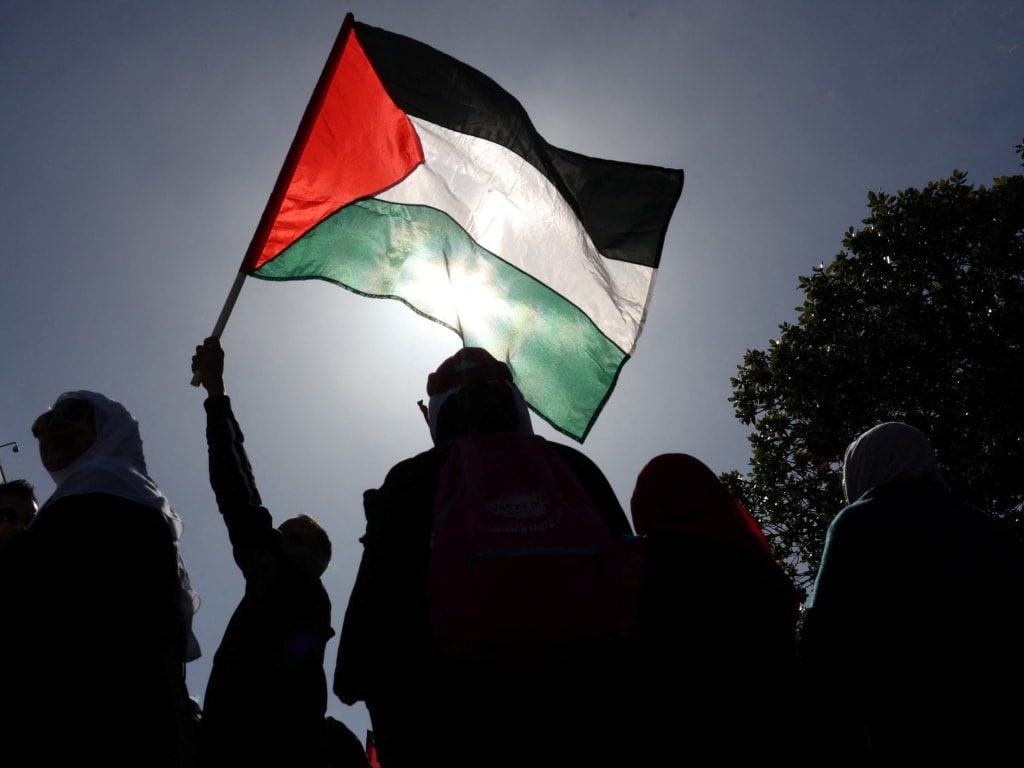
Title: The Ongoing Palestinian-Israeli Conflict: A Complex Struggle for Peace
Introduction
The Israeli-Palestinian conflict, a long-standing and deeply rooted dispute, continues to capture the world's attention as it unfolds in the heart of the Middle East. For decades, the region has witnessed violence, tension, and complex negotiations as both Israelis and Palestinians strive to secure their rights and a peaceful coexistence. This article delves into the multifaceted aspects of the conflict, its historical roots, recent developments, and the challenges faced in the quest for a lasting peace.
Historical Background
The roots of the Israeli-Palestinian conflict can be traced back to the late 19th century when Jewish migration to Palestine began, driven by the Zionist movement's aim to establish a homeland for Jewish people. This immigration, supported by Western powers, led to tensions with the Arab population, who felt that their land and rights were being gradually eroded. The 1947 United Nations Partition Plan for Palestine, which proposed the establishment of separate Jewish and Arab states, was met with resistance and laid the groundwork for the subsequent conflicts.
The War of 1948, also known as the Arab-Israeli War, marked a pivotal moment. Israel declared its independence, leading to confrontations with neighboring Arab states and the displacement of hundreds of thousands of Palestinians. This event, known as the Nakba or "Catastrophe," remains a significant point of contention in the ongoing struggle.
Occupation and Intifadas
The post-1948 period saw the establishment of the State of Israel, leading to the displacement and dispossession of a large Palestinian population. The Six-Day War in 1967 resulted in Israel occupying the West Bank, Gaza Strip, and East Jerusalem, which further complicated the situation. Palestinians in these territories lived under Israeli control and faced issues such as land seizures, restrictions on movement, and the construction of settlements.
The First Intifada, a Palestinian uprising against Israeli occupation, began in 1987, followed by the Second Intifada in 2000. Both periods saw widespread violence and loss of life. Despite efforts to broker peace agreements such as the Oslo Accords, a resolution remained elusive.
Peace Processes and Stumbling Blocks
Numerous attempts have been made to reach a peaceful resolution, including the Oslo Accords, the Camp David Summit, and the Annapolis Conference. These negotiations aimed to establish a two-state solution, with Israel and Palestine coexisting side by side.
However, several stumbling blocks have hampered progress. Issues such as the status of Jerusalem, borders, the right of return for Palestinian refugees, and security concerns have remained deeply contentious. Settlement expansion in the West Bank, a major point of contention, has continually strained relations between the parties.
Recent Developments
In recent years, the situation has witnessed a series of notable developments. In 2018, the United States recognized Jerusalem as Israel's capital and moved its embassy there, a decision met with global criticism and Palestinian protests. The Trump administration's "Peace to Prosperity" plan was unveiled, but it faced skepticism due to perceived bias towards Israel.
Elections in Israel have also brought a degree of political instability, with frequent changes in leadership. Similarly, internal Palestinian politics have been marked by divisions between Fatah, which controls the West Bank, and Hamas, which governs Gaza.
The Gaza Strip has been a particularly volatile area, witnessing multiple conflicts between Israel and Hamas, including the devastating Gaza wars in 2008-2009, 2012, 2014, and the most recent one in 2021. These conflicts have caused immense suffering and destruction on both sides, with a significant impact on civilian populations.
Challenges to Peace
The quest for a lasting peace in the Israeli-Palestinian conflict faces numerous challenges. Trust has eroded over the years, making negotiations difficult. Regional actors, including Iran and Gulf states, have sought to exert influence and further complicate the situation.
The expansion of Israeli settlements in the West Bank remains a major obstacle. Settlements are considered illegal under international law and have drawn widespread criticism, making the establishment of a contiguous and viable Palestinian state challenging.
The Right of Return, a core Palestinian demand, presents another complex issue. Palestinians who fled or were displaced during the 1948 and 1967 wars and their descendants seek the right to return to their ancestral homes in what is now Israel. Israel opposes this, fearing demographic shifts.
The status of Jerusalem, a city of great religious and historical significance to both Israelis and Palestinians, remains a contentious point. While Israel claims the entire city as its capital, Palestinians seek East Jerusalem as the capital of a future Palestinian state.
Conclusion
The Israeli-Palestinian conflict is a protracted and deeply entrenched struggle that has defied resolution for decades. Its historical roots, ongoing violence, and complex negotiations make it one of the most challenging conflicts in the world.
Efforts to reach a peaceful two-state solution remain crucial for regional stability and the well-being of the Israeli and Palestinian people. International mediation, confidence-building measures, and a renewed commitment to dialogue are essential for paving the way towards a lasting resolution to this complex and deeply emotional conflict.





Comments
There are no comments for this story
Be the first to respond and start the conversation.